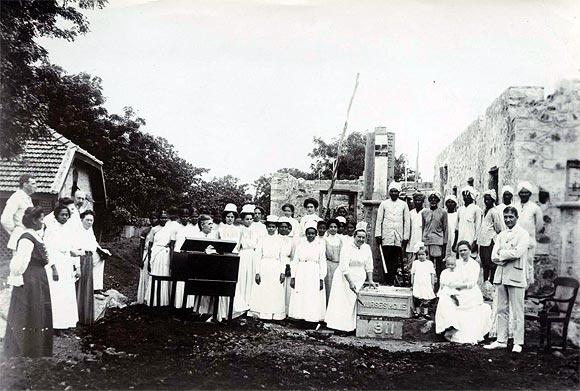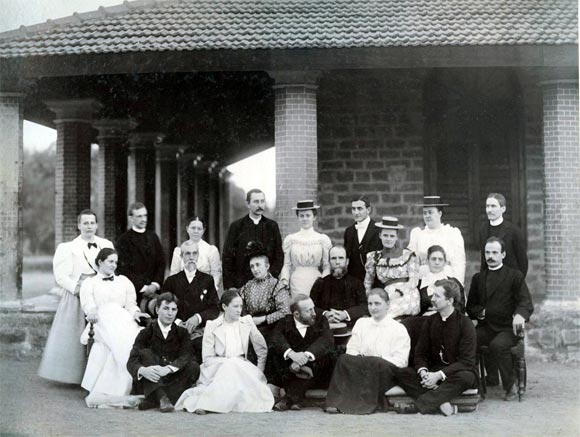 | « Back to article | Print this article |
Exclusive: The India-born family aboard the Titanic
The Titanic had an India connection.
Allen Oliver Becker's family journeyed from Guntur to London and boarded the Titanic on April 10, 1912.
Vaihayasi Pande Daniel pieces together what happened next. A Titanic centenary special.
The little girl with the white bow in her hair and the toddler boy in the lap of the young woman were both born in the Madras Presidency in British India, at Guntur and Kodaikanal respectively. So was their elder sister.
The children of American Lutheran missionary parents, they are posing in this photograph at the ceremony for the laying of the foundation stone of a nurses's home at the mission hospital in Guntur in present day eastern Andhra Pradesh.
The photograph, taken in July 1911, about nine months before the three children with their mother -- their father, far right in the white shoes, stayed behind -- journeyed to England and then boarded the RMS Titanic for New York on April 10, 1912.
All three children survived the great sea disaster, five days later on April 15. As did their mother.
Marion Louise, Richard and Ruth Elizabeth were the children of Allen Oliver Becker and his wife Nellie E Baumgardner Becker.
Ruth went on to become one of the oldest survivors of the mid-Atlantic disaster. She died 78 years later after the Titanic went down, in 1990 at the age of 90.
But for the greater portion of a life -- that you can only call lucky -- she rarely mentioned to anyone that she had been aboard the Titanic.
Allen Becker, her father, hailed from Springfield, Ohio, and met his wife Nellie, the daughter of a photographer, at Wittenberg University, where they both studied, he at the School of Divinity.
Shortly after they were married in 1898, the United Lutheran Church posted Allan Becker to work in an orphanage in Guntur.
Three of their four children were born in India. Their eldest child Ruth spent the first 12 years of her life in India and apparently loved it.
But Nellie Becker, according to historian Tom Taylor (in an article in an April 2010's This Month in Wittenberg History) found India's heat and its reptiles difficult to take and suffered.
What sent Nellie on that ill-fated journey back home with her children was the illnesses her family suffered.
She had lost a child, Luther, to tetanus; her husband was suffering from lead poisoning; and when little Richard took sick, Nellie decided to steer the family (as well as their household effects; that included a variety of Indian curios) home to America. Husband Allen was to follow later.
Nellie and her three children, who occupied the F-4 cabin as second class passengers (their tickets cost 39 pounds each) on the 882-foot long, 46,328 ton ship, were four of the 710 survivors (apart from three dogs) among the 2,224 passengers of the ill-fated Titanic.
The family had boarded the brand-new ship before noon on April 10 at Southampton, after a short stopover in London (they reached London via the Suez Canal on April 5, Good Friday), where Ruth, Richard and Marion visited the zoo, Madame Tussaud's, among other landmarks.
London was an interesting contrast for the trio of children who had grown up in rural India.
As was probably the maritime wonder -- the Titanic.
Please click Next to read further...
'It was a beautiful night and a terrible sight'
When the ocean liner, built to be the safest ship in the world, hit a giant wandering iceberg in the 'iceberg alley' of the Grand Banks of Newfoundland (a shipping lane prone to drifting multi-tonne icebergs that break off from Greenland) at 11.40 pm, April 14, it awoke Nellie Becker.
She recalled in an interview to the Springfield Daily News in 1912, 'The collision awakened me. There was a little shock... just sort of a grating sound. I really believed it was the stopping of the engines that aroused me... fear filled me, not so much for myself but for my children. I seemed to have a premonition that something was wrong.'
When Nellie was assured all was just fine, she returned to her cabin. She was unable to sleep because of a sense of unease, something that had dogged her since her misfortunes in India.
When she checked with a steward next she was instructed to rush to the deck, and not to stop to collect personal belongings or to dress.
Nellie Becker hastily wrapped her family in blankets, and made sure they had footwear, before they rushed up to the deck.
The children were taken from her and placed into lifeboats -- Marion and Richard in lifeboat 11 and Ruth, the eldest, in lifeboat 13 (the last boat to leave the Titanic).
Fortunately, a place was later found for Nellie in one of the boats (a majority of the women and children survived the sinking even among 3rd class passengers).
'We hurried to the deck,' she would tell the Springfield Daily News, 'There seemed to be little noise and no unusual excitement... When the order came to put on the life preservers, I helped my children into them... the order came and found me ready to give my children a chance for life away from the sinking ship.'
'The children were put into one of the boats and carefully tucked in with the blankets wrapped about them,' she recalled. 'They began to lower the lifeboats and I stepped back.'
The 20 lifeboats drifted in the bitterly cold sea as the majestic ship gradually listed and then went down in a show of lights at 2.20 am.
Nellie told the Springfield Daily News: 'It was going down very slowly, not fast at all, and the night was dark, no moon. That boat was just beautiful, all the lights were on... I thought it was a beautiful night and a terrible sight.'
Around them tonnes of debris as well as bodies floated and passengers seeking to survive, in spite of not having a place in a lifeboat, thrashed about helplessly in the water.
The shivering, traumatised Beckers, fortunate to be alive, were terrified of the icebergs floating around them and nervously waited for dawn.
A sobbing Nellie recounted later: 'The most horrible thing, which clings to me yet were the shrieks of the dying just after the boat plunged. We could see drowning men all around. Some could not have been very far off. There was no more room in our boat, and helpless as if our hands were tied, we had to sit there and watch men perish...'
'My children were sobbing from fright,' she remembered. 'I gathered them close to me to protect them as much as possible, and we just sat there through the long, dark cold hours of the night, silently praying.'
'How often I thought what a blessing it was that Mr Becker was not with us,' she said.'He surely would have been lost.'
The RMS Carpathia, which had been heading for Fiume (in present day Croatia), arrived at the scene two hours after the unsinkable Titanic disappeared from view.
Nellie Becker and her family clambered aboard the ship. But since the plucky Ruth was in another lifeboat (the first to be rescued by the Carpathia) it took many hours for her mother Nellie to locate her aboard the Carpathia.
Please click Next to read further...
'I never doubted that we would be rescued'
'You can imagine our joy because we knew it must be a rescue ship,' Ruth would recall in Titanic: Destination Disaster, years later, about sighting the Carpathia.
'All of us shouted and yelled. I had promised the little German lady (Leah Aks) that I would help her find her baby. I wanted to find my mother too.'
'Moving around the ship from first to second (class), to be sure we didn't miss any of the passengers as they came in, and looking over the deck railing it seemed liked hours had gone by while we watched the lifeboats come in.'
'Around ten o'clock I found my mother. A passenger came up to me and said "Are you Ruth Becker?" I said, "Yes." She said, "Your mother has been looking all over for you." So she took me to Mother and our family was reunited.
'Of course, Mother and I were delighted to see each other. She was a nervous wreck, crying when anybody asked about her experience. And no wonder! Having the responsibility of taking care of two little children and not being sure that I had gotten off the Titanic. The experience hadn't affected me emotionally at all, so I answered all the questions.'
Apart from the exposure to the cold and shock, the four Beckers were one of the few families to survive the disaster. The Carpathia took three days to reach New York and docked in pouring rain on the evening of April 18 to be greeted by 40,000 people.
Nellie Becker's father anxiously awaited news of his daughter and grandchildren in Springfield, Ohio. He had learnt that their names were on the list of rescued passengers wired from the Carpathia, but only rested easy when he received a telegram from Nellie after she landed in New York.
'Don't ask me anything! Ask Ruth, she'll tell you everything,' a shattered Nellie told reporters at Pier 54, when the ship docked. Ruth had come through the harrowing crisis quite well and told the Benton Harbour News-Palladium in 1960, 'I never doubted that we would be rescued.'
After a complimentary night's stay in a hotel in New York and a shopping expedition to get new clothes, the Beckers caught a train to Benton Harbour, Michigan, where Allen's family lived.
Nellie severely instructed Ruth to not reveal to anyone on the train that they had been on the Titanic, and from then on, Ruth, it seems, largely kept her experiences to herself.
Allan Becker returned from India eight months later.
Ruth schooled in Ohio at the West Tech High School in Cleveland and went on to do university there too (Wittenberg University, like her parents) and became a teacher in Kansas.
Sister Marion died young of tuberculosis. Brother Richard became a singer and later a social welfare worker and died at the age of 68 in Illinois.
Nellie was never the same again and remained a nervous wreck for the rest of her life, exhibiting erratic behaviour.
After retirement Ruth moved to Santa Barbara where she began to open up about her voyage of a lifetime. On the 70th anniversary of the sinking of the Titanic, she attended a convention of the Titanic Historical Society.
In the year before she died, she took her second ocean voyage, venturing onto a ship going to Mexico.
When she died in 1990, she requested that her ashes be scattered over the Grand Banks, Newfoundland, Canada, in the oceanic vicinity of where the Titanic had sunk, nearly killing her family.


